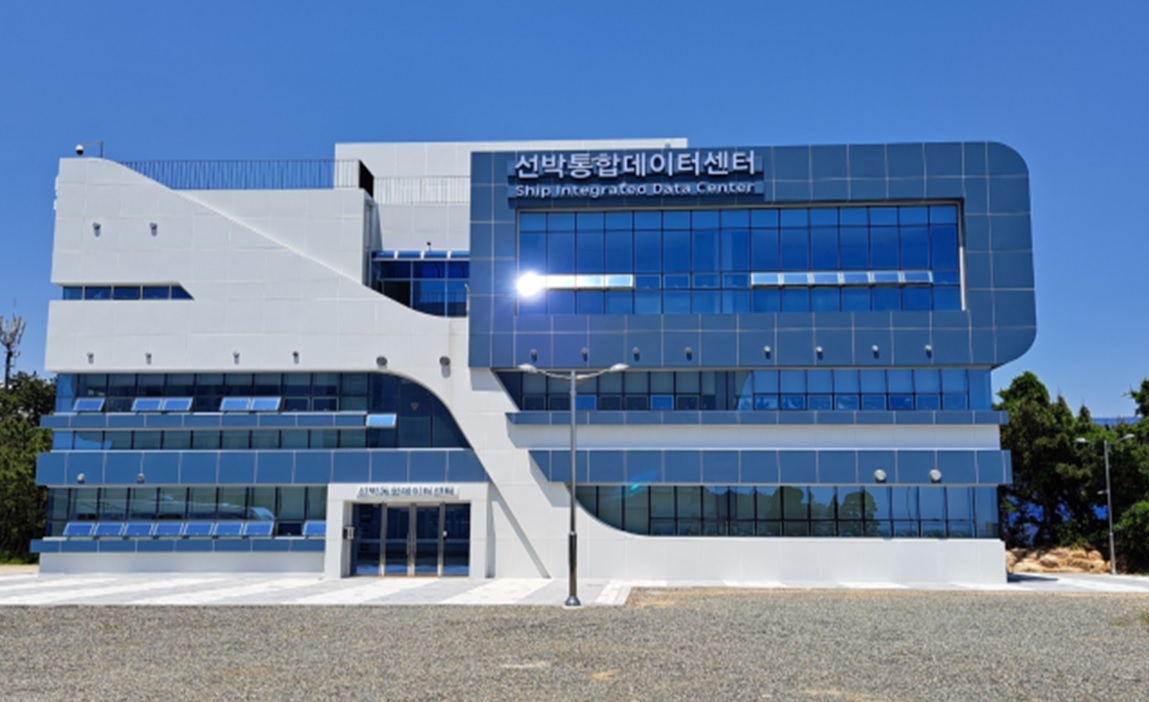[Press Release]
Establishment of an Advanced Technology Demonstration Hub for the Shipbuilding and Maritime Industry in Ulsan
Monday, September 30, 2024
News URL :

The Ministry of Science and ICT (Minister Yoo Sang-Im), Ulsan Metropolitan City (Mayor Kim Doo-Gyeom), and the Ulsan Information Industry Promotion Agency (Director Jang Byeong-Tae) announced that they held the opening ceremony for the ‘Integrated Ship Data Centre’ in Goneul District, Dong-gu, Ulsan, on the 27th.
The Integrated Ship Data Centre was established as a key hub for the ‘AI-Based Ship Logistics Platform and Navigation System Demonstration Project’, led by the Ministry of Science and ICT. This project aims to promote the localisation of navigation and communication equipment and develop an Integrated Navigation System (INS) in preparation for the intelligent and autonomous shipping market within the shipbuilding and maritime industries.
The Ulsan City government invested 4 billion KRW into the Integrated Ship Data Centre, a four-storey building with a total floor area of 853㎡. The centre will play a key role in collecting and analysing real-time ship operations and maritime logistics data. It will also serve as a hub for logistics, ship and operational monitoring, quality testing of shipbuilding software, digital transformation education for the shipbuilding and maritime industries, and support for local shipbuilding software companies.
In the future, the centre will provide new digital services as a core hub, including ‘Integrated Control Solutions’ for monitoring ship positions, routes, and fuel levels in real-time from shore and supporting efficient navigation. Additionally, the centre will offer an ‘Optimal Logistics Decision Support Service,’ which will test efficient loading and scheduling based on real-time logistics information, as part of the AI-based Ship Logistics Platform and Navigation System Demonstration Project.
Ulsan City expects that the opening of the Integrated Ship Data Centre will greatly enhance ship safety and navigation efficiency by enabling the integrated management and analysis of various operational data.
Meanwhile, the Ministry of Science and ICT has invested a total of 36.9 billion KRW (25.5 billion from national funds, 4 billion from local funds, and 7.4 billion from private investment) into the AI-based Heavy Cargo Logistics Platform Demonstration Project over four years, starting in 2021. The project focuses on △building a digital logistics platform, △developing localised navigation and communication equipment, and △securing practical results (track records) through maritime demonstrations of coastal logistics ship operations.
The digital logistics platform being developed will enable stakeholders (cargo owners, shipowners, shipping companies, ports, etc.) to share real-time information generated during shipping logistics (cargo movement → loading → departure → sailing → arrival → unloading) in a digital, rather than analogue, format.
In addition, the project has recently succeeded in localising key navigation and communication equipment, such as the intelligent Integrated Navigation System (AI-INS), which currently holds over 90% of the global market share, primarily dominated by Japan and Norway. The project has localised equipment such as ship radars and autopilot systems, which help ships navigate along routes that take into account external environmental factors like currents, wind, and waves.
The Ministry of Science and ICT successfully installed this equipment on the ship Ulsan Taehwa and completed performance tests and on-site verification in waters near Ulsan, Pohang, Busan, and Jeju over approximately nine months (10,280 km of sailing). The project also achieved internationally recognised certification from DNV, the Norwegian classification society, which was the first for Korea.
Hwang Gyu-Cheol, Director of Software Policy at the Ministry of Science and ICT, commented, “As the transportation sector shifts towards Software Defined Vehicles (SDVs), the importance of ship operation and logistics data is increasing. We hope that the Integrated Ship Data Centre will create new digital services and added value based on key data from the shipbuilding and maritime industries, and become a vital infrastructure leading these industries.”
An official from Ulsan City stated, “The Integrated Ship Data Centre is expected to play a key role in generating new growth engines for the shipbuilding and marine industries, as well as serving as a hub for next-generation ship research. Through this, we aim to create a new ecosystem for the shipbuilding industry and secure a competitive edge in future markets, strengthening the competitiveness of the local shipbuilding and marine industries.”
Furthermore, Ulsan City plans to establish an ‘Integrated Performance Verification Centre’ next year as part of the ‘Maritime Logistics Communication Technology Verification Test Bed’ project. This will create synergy by concentrating on advanced shipbuilding research institutions and establishing a proactive response system to the paradigm shift towards smart ships, aiming to become Korea's leading shipbuilding and marine research hub.